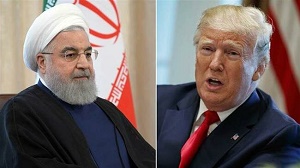US President Donald Trump has distorted remarks by his Iranian counterpart, Hassan Rouhani, regarding Tehran’s uranium enrichment plans in reciprocation of Washington’s unilateral exit from a 2015 nuclear deal and the other parties’ failure to keep their side of the accord.
On Wednesday, Rouhani said Iran would surpass the limit placed by the Joint Comprehensive Plan of Action (JCPOA) on the level of purity of the uranium it produces when the July 7 deadline set by Tehran for the remaining deal partners expires.
“The level of uranium enrichment will no longer stay at 3.67 percent,” the Iranian president said. “This commitment [taken under the nuclear deal] will be set aside, and we will enhance [the enrichment level] to whatever amount, which we deem necessary and need.”
Reacting to Rouhani’s comments, Trump tried to suggest that Iran was seeking a “new deal.”
In a tweet, he claimed Rouhani had threatened to increase uranium enrichment if there is no “new Nuclear Deal.”
The US president pulled the US out of the JCPOA last May, calling it the “worst deal ever negotiated,” leaving the fate of the landmark diplomatic achievement in doubt.
Washington then unleashed a campaign of “maximum pressure” on Iran in an attempt to force Tehran into negotiating a “new deal,” which would cover the Islamic Republic’s conventional missile activities and its counter-terrorism role in the region.
Iran has repeatedly stressed that it would not renegotiate the deal with the US, urging Washington to return to the nuclear agreement, which has been endorsed by the UN Security Council.
In his tweet, Trump also threatened the Islamic Republic to be “careful with threats” as they can “come back to bite you.”
Iran ‘to respond to US threats with active resistance’
Meanwhile, Kayvan Khosravi, the spokesman for Iran’s Supreme National Security Council (SNSC), said diplomacy and threatening rhetoric did not go together.
He said the Iranian nation had been facing the “bite” of American hostility for the past 40 years but that the “antivenin of active resistance” would continue to keep Iran steadily on its feet.
Tensions have been running high between Tehran and Washington since last year, when Trump withdrew the US from the JCPOA and unleashed the “toughest ever” sanctions against Iran, notably targeting its energy sector.
In the wake of Washington’s pullout, the JCPOA cosignatories pledged to make efforts to save the deal by protecting Iran against Washington’s “toughest ever” sanctions, but they failed to adopt practical measures to that effect.
On May 8, a year into Washington’s exit, Tehran announced a decision to scale back its own commitments and gave a 60-day deadline for the other parties to fulfill their side of the deal.
Tehran has said it would reduce more of its commitments beyond the June 7 deadline if the other signatories continue to fail Iran.
Iran, however, says its countermeasures are reversible if the other parties meet Iran’s demands.
Trump’s new threat comes as the US has taken a quasi-warlike posture against Iran and stepped up its provocative military moves in the Middle East.
Last month, the US sent a drone on a spying mission into Iran’s airspace over the coastal province of Hormozgan following reports of a plan by the
US to launch a “tactical assault” on a nuclear facility, that aircraft was shot down by Iranian air defenses.
PRESS T.V
R.S

